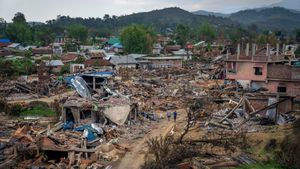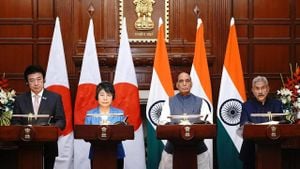As the war in Gaza continues into its tenth month, the international community looks on with heightened anxiety over the potential for wider regional conflict. Recent events, including the assassination of Hamas’s political chief Ismail Haniyeh in Tehran and rampant Israeli airstrikes, have compounded fears of escalating violence that could pull various nations into the conflict.
Haniyeh was reportedly killed early on a Wednesday morning, with Hamas directly blaming Israel for this act. His death raises concerns that the fragile ceasefire talks could be irreparably damaged. Coinciding with this tense situation, Israel's military operations persist relentlessly.
Data compiled by the Armed Conflict Location and Event Data Project (ACLED) paints a troubling picture of the conflict's expansion. Since October 7, Israel has executed over 17,000 military actions across the Middle East, affecting countries including Lebanon, Syria, Yemen, and Iran. The Gaza Strip has borne the brunt of this violence, with over 10,000 incidents recorded amid the chaos.
The majority of these strikes target Gaza, drawing the ire of multiple stakeholders, including Iran and Hezbollah. In response to support for Palestinian liberation struggles, Israeli forces have systematically escalated strikes in Lebanon. Recent attacks following a Hezbollah military response to Israeli operations indicate a burgeoning crisis, with civilian casualties accentuating the already dire humanitarian situation.
Hezbollah has not stood idle in this conflict, with retaliatory measures intensifying in response to perceived breaches of peaceful conduct. Since October 8, when Hezbollah first retaliated against Israel, the number of Israeli strikes on Lebanese territory has surged, claiming hundreds of lives, including non-combatants.
Unfolding incidents have drawn media attention, particularly the tragic attack on school facilities in Gaza, resulting in multiple fatalities among innocent children. This blatant disregard for civilian life is seen by many as indicative of a broader pattern of violence that overlooks human rights considerations.
While the war rages, political discourse within the United States is also shifting. Jill Stein, a candidate with the Green Party, is now considering a slate of Palestinian rights advocates for the vice-presidential spot. This strategic move comes as disillusionment grows with mainstream Democratic perspectives on Israel, particularly in light of President Joe Biden’s now-shelved campaign.
Political strategists posit that having a vocal advocate for Palestinian rights on the ticket could not only galvanize disenchanted voters but also elevate the conversation surrounding U.S. foreign policy regarding Israel-Palestinian relations. The candidates under consideration each carry a history of advocacy against the current U.S. support for Israel and its military-industry complex.
The broader implications of the Gaza conflict seep into electoral sentiments in the U.S., particularly affecting communities with significant Arab-American populations. Data suggests that Biden’s standing has sharply declined among these constituents following the outbreak of conflict. Prominent voices among these demographics argue that potential political alignments within progressive movements must reflect a more holistic approach to foreign policy, one that resonates authentically with their experiences and aspirations for peace.
Grassroots movements are emerging, calling to spotlight the dire circumstances facing Palestinian political prisoners and detainees amid ongoing military operations. Reports reveal widespread violations of human rights within Israeli detention facilities, raising alarms about conditions far exceeding international human rights standards.
Qadura Fares, head of the Commission of Detainees Affairs in Palestine, asserted the need for global solidarity against the Israeli regime's actions. Advocates demand the international community recognize and respond to systematic abuses, including overcrowding, torture, and other forms of collective punishment faced by political prisoners.
Sexual violence and maltreatment have reportedly reached alarming levels in Israeli prisons, where detainees are subjected to brutal conditions that are reminiscent of historical atrocities committed in notorious detention centers worldwide. These revelations evoke serious questions regarding the ethics and legality of Israel’s practices concerning prisoners.
Coalitions have called for massive protests to raise awareness globally, urging nations to impose sanctions and hold the Israeli government accountable for its actions. The urgency of addressing the humanitarian crisis in Gaza has sparked a collective response, with organizations gathering support and demanding the global community intervene.
Highlighting the historic negligence of Palestinian rights in global discourse, many see Stein’s potential vice-presidential selection as an opportunity to challenge entrenched norms within U.S. politics regarding foreign policy. By placing a vocal advocate on the ticket, supporters hope to reshape conversations and motivate a more substantial reckoning with the implications of American complicity in ongoing violence.
As the death toll rises and humanitarian conditions deteriorate within Gaza, the dichotomy between political narratives and ground realities continues to widen. The systemic barriers obstructing the pursuit of peace only serve to intensify the call for collective global action against the injustices faced by Palestinian people.
The continued violence raises pertinent questions about the future of the region. With every strike, hope diminishes for resolution; with every assassination, the cycle of vengeance strengthens. The role of international stakeholders in striving for a two-state solution may hold the key for future generations to coexist peacefully.
In this heated geopolitical landscape, the world watches with bated breath, waiting for signs of change that might illuminate the path toward resolution, preventing further loss of life and fostering a more just and equitable landscape for all involved.
As discussions proceed regarding Israel’s future and its policies toward Palestine, it becomes increasingly evident that the voices advocating for justice and peace cannot be silenced. Instead, they grow louder, seeking acknowledgment of dignity, rights, and human life amid the backdrop of a beleaguered landscape.



